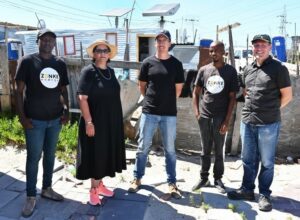As part of the City’s Urban Energy Poverty Programme, alternative energy solutions are being investigated in informal settlements where grid-connected electrification is not possible. In City-supplied areas, where feasible, almost 100% of the older existing informal settlements have been electrified. But there are many existing and newer settlements that exist or that have formed on land where it is not possible to electrify, such as on wetlands, in ponds or on roads- and nature reserves.
Access to safe and sustainable energy sources remains a vital focus for the City not only to improve living conditions but also to reduce the risk of devastating fires primarily caused by open, unattended flames. City Mayoral Committee Member, Councillor Beverley van Reenen, met up with active community partners in the alternative energy sphere, iShack (in Blackheath), Zonke Energy and the University of Exeter (in Qandu Qandu, Khayelitsha) for a first-hand look at how these organisations are working to solve access to household power and public lighting in areas where grid-connection is not possible. Through partnerships such as these, the City hopes to bring real change to residents in informality over the years to come. ‘The communities where these alternative pilot projects are being rolled out are very happy about the intervention. ‘Our investigation looks into what are the benefits and opportunities to scale up such alternative energy solutions. Our focus is on indoor solar lights, renewable energy public lighting, alternative energy for cellphone charging as well as wonderbags and cooking insulators for affordability and safety. Alleviating energy poverty and enhancing safety are also key focus areas of the City’s Energy Strategy that is being launched this week. What is so inspiring is that we can all work together to bring renewable, cleaner and more affordable energy to our communities and to enhance safety and dignity for our residents who live in areas that will remain off-grid due to the nature of the settlement or the land. ‘As a City, we are doing a lot of work in this realm and community buy-in is key. We are also keen to learn from the partner-experts at grassroots level and I commend organisations such as iShack, Zonke Energy, and the University of Exeter for their unfaltering commitment to our residents. Together, we can change the realities of our most vulnerable residents,’ said Councillor Van Reenen. As part of the investigation into alternative renewable energy solutions in informal settlements, the City has also conducted community surveys to gain first-hand knowledge of community perceptions of alternative energy and what the hurdles and opportunities are. The research will inform the nuts and bolts of the Urban Energy Poverty Programme over the next years. iSHACK ‘With all the talk about the Just Energy Transition, I think South Africa is still missing a huge opportunity for enterprise development and job creation in alternative energy services within the so-called informal economy. At iShack we provide basic solar electricity – using small off-grid solar units, and we’re now active in nine informal settlements in Cape Town. But we see that the majority of residents cannot afford the service. Our national laws and indigent policies do make provision for subsidised basic energy, but those who are most in need do not receive it because they are not connected to the grid. So we’re really pleased that the City is actively engaging with a range of alternatives. We hope that the city will trailblaze a truly market-making policy that enables the poorest households to access the admittedly limited funds for free basic energy, so that they can finally have a choice of affordable alternative energy services,’ said Damian Conway from Sustainability Innovation Lab (“iShack”) ZONKE Energy ‘Zonke Energy’s mission is to ensure that all South Africans benefit from a transition to clean energy, and our service is designed to meet their aspirations at an affordable cost. However, there is still a large affordability gap that needs to be addressed. We’re very encouraged by the city’s efforts to explore what a free basic energy (FBE) service could look like for off-grid households, who despite being most in need of the policy are currently excluded. This could be the beginning of a huge shift for South Africa,’ said Alex Densmore from Zonke Energy. University of Exeter‘Funding from the Newton Fund provided an opportunity for a partnership between the University of Exeter and the University of Cape Town to demonstrate an alternative approach to public lighting for un-electrifiable informal settlements, a component of service delivery that’s often neglected when considering service provision for informal settlements. The absence of appropriate public lighting after dark it has a profound impact on the wellbeing of residents. By co-developing the project with the users and acknowledging them as central to its implementation, the project has shown meaningful improvements to life after dark and contributed to a sense of custodianship. The project is one of three similar projects in Khayelitsha implemented by collaborators in the ‘LightUp’ community of practice,’ said Federico Caprotti, University of Exeter.
Projects that the City is looking to explore through partnerships and donors: Piloting alternative public lighting options such as solar lights in informal settlements The City provides public lighting in the form of high-mast lights in residential areas where access roads are limited. Although high-mast lights provide light to a large area, the quality of light tends to be poor in the small pathways between shacks because of the deep shadows they cast. The City seeks corporate social investment (CSI) funding, donations or sponsorship for solar public lights for informal settlements that are not yet connected to grid electricity. Solar indoor lights and cell phone charging devices Solar lights provide good quality indoor light, are safe to use and can be charged easily. The capability for households to charge small devices like cell phones is crucial for low-income households, as these devices are essential for accessing information and communication, including job opportunities. The City is seeking partnerships, funding, donations and sponsorship and for awareness-raising around indoor solar lights for households in informal settlements that are not connected to grid electricity. Smart cookers and wonder bags A smart cooker insulates the pot and allows it to continue cooking the food once it has begun to boil without using further energy from the stove. This will save people money. It is easy to make a smart cooker using readily available materials. Organisations are welcome to assist the City in raising awareness about how to easily make a smart cooker or to donate smart cookers or wonderbags to low-income households in the city. Education and Awareness Education and community awareness play a vital role in enhancing the understanding of various energy sources, along with their associated benefits and risks. It is essential to provide education on solar technology within communities to enhance their knowledge. This education may encompass safe practices such as safe candle usage and the importance of ventilation when utilizing paraffin as an energy source, aiming to mitigate the adverse effects of these energy sources like indoor pollution. Organisations are encouraged to support the City in raising awareness and providing education on various energy sources, including solar energy.






